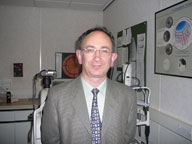Bradford University's optometry course is distinguished by its clinical edge, department head Professor David Elliott tells Emma White
Bradford University's optometry department offers students a BSc Hons optometry degree and a year-long career progression programme designed for contact lens opticians to qualify as optometrists. This course is soon to be extended to dispensing opticians without a contact lens qualification.
The department was awarded 23 out of 24 in a recent subject specialist review of teaching quality and department head Professor David Elliott says that Bradford's distinguishing quality is its clinical edge.

'On the first week of the first year, students will pick up a direct ophthalmoscope and look in the back of a person's eye. Right from the beginning we teach them the basics including retinoscopy and subjective refraction. We build on this in the second year and put it into practice in the third.'
Register now to continue reading
Thank you for visiting Optician Online. Register now to access up to 10 news and opinion articles a month.
Register
Already have an account? Sign in here
